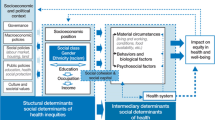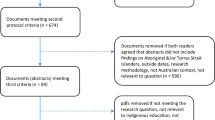Abstract
This essay presents a critical appraisal of the current state of baccalaureate Health Humanities, with a special focus on the contextual differences currently influencing the implementation of this field in Canada and, to a lesser extent, the United States and United Kingdom. I argue that the epistemological bedrock of Health Humanities goes beyond that generated by its written texts to include three external factors that are especially pertinent to undergraduate education: site (the setting of Health Humanities education), sector (the disciplinary eligibility for funding) and scope (the critical engagement with a program’s local context alongside an emergent “core” of Health Humanities knowledge, learning, and practice). Drawing largely from the Canadian context, I discuss how these differences can inform or obstruct this field’s development, and offer preliminary recommendations for encouraging the growth of baccalaureate Health Humanities—in Canada and elsewhere—in light of these factors.
Similar content being viewed by others
References
Albert, Mathieu and Elise Paradis. 2014. “Social Scientists in the Health Research Field: A Clash of Epistemic Habitus.” In Handbook of Science, Technology, and Society, edited by Daniel Lee Kleinman and Kelly Moore, 369-387. Routledge.
Atkinson, Sarah, Bethan Evans, Angela Woods, and Robin Kearns. 2015. “The Medical’ and ‘Health’ in a Critical Medical Humanities.” Journal of Medical Humanities 36:71–81. doi:10.1007/s10912-014-9314-4.
Barrish, Phillip. 2016. “Health Policy in Dystopia.” Literature and Medicine 34 (1): 106–131.
Becher, Tony and Paul R. Trowler. 2001. Academic Tribes and Territories: Intellectual Enquiry and the Culture of Disciplines. Philadelphia: Open University Press.
Berry, Sarah L., Erin Gentry Lamb, and Therese Jones. 2016. Health Humanities Baccalaureate Programs in the United States. Center for Literature and Medicine, Hiram College. http://www.hiram.edu/images/pdfs/center-litmed/HHBP_8_11_16.pdf.
Blackie, Michael and Erin Gentry Lamb. 2014. “Courting Discomfort in the Undergraduate Health Humanities Classroom.” In Health Humanities Reader, edited by Therese Jones, Delese Wear, and Lester D. Friedman, 490–500. New Brunswick, NJ: Rutgers University Press.
Bleakley, Alan. 2015. Medical Humanities and Medical Education: How the Medical Humanities Can Shape Better Doctors. New York, NY: Routledge.
Bromham, Lindell, Russell Dinnage, and Xia Hua. 2016. “Interdisciplinary Research has Consistently Lower Funding Success.” Nature 534: 684–687. doi: 10.1038/nature18315.
Callard, Felicity, and Des Fitzgerald. 2015. Rethinking Interdisciplinarity across the Social Sciences and Neurosciences. Palgrave Macmillan, UK. Accessed May 2, 2017. http://link.springer.com/book/10.1057%2F9781137407962 doi: 10.1057/9781137407962
Cardinal, Cliff. 2012. Huff. Accessed July 5, 2016. http://www.nativeearth.ca/huff/.
Chandler, James, Arnold I. Davidson, and Harry D. Harootunian. 1993. Questions of Evidence: Proof, Practice, and Persuasion across the Disciplines. Chicago, IL: Chicago University Press.
Charise, Andrea and Marcela Costa. Forthcoming. “Exploring Student Perceptions of Canada's First Undergraduate Health Humanities Curriculum: A Qualitative Case Study” (University of Toronto REB #32777).
Cook, Harold. 2010. “Borderlands: A Historian’s Perspective on Medical Humanities in the US and the UK.” Journal of Medical Humanities 36:3–4.
Crawford, Paul, Brian Brown, Charley Baker, Victoria Tischler, and Brian Abrahms. 2015. Health Humanities. Houndmills, UK: Palgrave Macmillan.
Crawford, Paul, Brian Brown, Victoria Tischler, and Charley Baker. 2010. “Health Humanities: The Future of Medical Humanities?” Mental Health Review Journal 15 (3): 4–10.
Dreger, Alice D. 2015. Resignation letter to Northwestern University. Accessed August 23, 2016. http://alicedreger.com/sites/default/files/Dreger%20resignation%20from%20Northwestern.pdf
Frickel, Scott, Sahra Gibbon, Jeff Howard, Joanna Kempner, Gwen Ottinger and David J. Hess. 2010. “Undone Science: Charting Social Movement and Civil Society Challenges to Research Agenda Setting.” Science, Technology and Human Values 35 (4): 444–473. doi: 10.1177/0162243909345836.
Garrett, Jeremy R., Fabrice Jotterand, and D. Christopher Ralston. 2013. The Development of Bioethics in the United States. Amsterdam: Springer Netherlands.
Graham, Janice, Naomi Adelson, Sylvie Fortin, Gilles Bibeau, Margaret Lock, Sandra Hyde, Mary Ellen MacDonald, Ignace Olazabal, Peter Stephenson, and James Waldram. 2011. “The End of Medical Anthropology in Canada? A Manifesto.” University Affairs. February 7. Accessed October 23, 2016. http://www.universityaffairs.ca/opinion/in-my-opinion/the-end-of-medical-anthorpology-in-canada/
Gutierrez, Kevin A., and Sayantani DasGupta. 2015. “The Space that Difference Makes: On Marginality, Social Justice and the Future of the Health Humanities.” Journal of Medical Humanities 37(4): 435–448.
“Heartbeats: The Izzat Project.” 2012. Pomegranate Tree Group. Accessed July 5, 2016. http://pomegranatetreegroup.farrahkhan.ca/seed-projects/heartbeats-the-izzat-project/.
“History.” The University of British Columbia, Faculty of Arts, Creative Writing Program. Accessed July 5, 2016. http://creativewriting.ubc.ca/program-information/history/.
Jones, Therese, Paul Crawford, Maura Spiegel, Susan Squier, Anna Willieme, Erin G. Lamb, and Andrea Charise. 2014. Keynote Roundtable: “Designing the Future of Health Humanities.” Accessed August 23, 2015. https://www.youtube.com/watch?v=ttR2pFlE0ic.
Jones, Therese, Delese Wear, and Lester D. Friedman. 2014. “Introduction.” In Health Humanities Reader, edited by Therese Jones, Delese Wear, and Lester D. Friedman, 1–9. New Brunswick, NJ: Rutgers University Press.
Kidd, M.G., and J.T. Connor. 2008. “Striving to Do Good Things: Teaching Humanities in Canadian Medical Schools.” Journal of Medical Humanities 29 (1): 45–54.
Kingade, Tyler. 2015. “Noted Author Resigns from Northwestern in Censorship Protest.” The Huffington Post. Last modified August 25, 2015. Accessed May 2, 2017. http://www.huffingtonpost.com/entry/alice-dreger-resigns-northwestern_us_55dc84c5e4b08cd3359d4f95?kvcommref=mostpopular.
Kreber, Carolin. 2009. The University and Its Disciplines: Teaching and Learning Within and Beyond. New York, NY: Routledge.
Manzon, Maria. Comparative Education: The Construction of a Field. 2011. Hong Kong: Comparative Research Education Centre, The University of Hong Kong. PDF e-book. doi: 10.1007/978-94-007-1930-9.
Marra, Rose M. and Betsy Palmer. 2008. “Epistemologies of the Sciences, Humanities, and Social Sciences: Liberal Arts Students' Perceptions.” The Journal of General Education 57 (2): 100–118. doi: 10.1353/jge.0.0017.
McGurl, Mark. 2009. The Program Era: Postwar Fiction and the Rise of Creative Writing. Harvard, MA: Harvard University Press.
“Meet the Challenge of Interdisciplinary Science: Problems of Modern Society Demand Collaborative Research.” 2016. [Editorial] Nature 534:589–590. http://www.nature.com/news/meet-the-challenge-of-interdisciplinary-science-1.20185.
Metzl, Jonathon M. and Helena Hansen. 2014. “Structural Competency: Theorizing a New Medical Engagement with Stigma and Inequality.” Social Science & Medicine 103:126–133.
Miller, Thaddeus R., Timothy D. Baird, Caitlin M. Littlefield, Gary Kofinas, F. Stuart Chapin III and Charles L. Redman. 2008. “Epistemological Pluralism: Reorganizing Interdisciplinary Research.” Ecology and Society 13 (2): 46.
Naylor, David C., Robert J Birgeneau, Martha Crago, Mike Lazaridis, Claudia Malacrida, Arthur B. McDonald, Martha C. Piper, Remi Quirion, and Anne Wilson. 2017. “Investing in Canada’s Future: Strengthening the Foundations of Canadian Research.” Canada’s Fundamental Science Review. Accessed April 23, 2017. http://www.sciencereview.ca/eic/site/059.nsf/vwapj/ScienceReview_April2017.pdf/$file/ScienceReview_April2017.pdf
National Center for Education Statistics. 2014. Summary of U.S. Department of Education Digest of Education Statistics, 2014 (NCES 2016–006), Chapter 3. Accessed August 23. 2016. http://nces.ed.gov/fastfacts/display.asp?id=98.
Namukasa, Glaydah. 2006. Voice of a Dream. Macmillan Education.
“NEH Grants: Humanities Connections.” 2016. National Endowment for the Humanities. Accessed July 4, 2016. https://www.neh.gov/grants/education/humanities-connections.
Ousager, Jakob and Helle Johannessen. 2010. “Humanities in Undergraduate Medical Education: A Literature Review.” Academic Medicine 85 (6): 988–98. doi: 10.1097/ACM.0b013e3181dd226b.
Parker, Jan. 2008. “What have the humanities to offer 21st-century Europe? Reflections of a note taker.” Arts and Humanities in Higher Education 7 (1): 83–96. doi:10.1177/1474022207080851
Peeters, Frederick. 2008. Blue Pills: A Positive Love Story. Houghton Mifflin Harcourt.
Polgar, Michael. 1996. “Social Constructions of HIV/AIDS: Theory and Policy Implications.” Annual Review of Health Social Science 6 (1): 81–111.
“Population by Year, by Province and Territory (Number).” 2015. Statistics Canada. Last modified September 29, 2015. Accessed May 2, 2017. http://www.statcan.gc.ca/tables-tableaux/sum-som/l01/cst01/demo02a-eng.htm.
“Postsecondary Enrolments by Institution Type, Registration Status, Province and Sex (Both Sexes).” 2014. Statistics Canada. Last modified November 30, 2015. Accessed May 2, 2017. http://www.statcan.gc.ca/tables-tableaux/sum-som/l01/cst01/educ71a-eng.htm.
Rescher, Nicholas. 2003. Epistemology: An Introduction to the Theory of Knowledge. Albany, NY: State University of New York Press.
“scope, n.2.” OED Online. September 2016. Oxford University Press. Accessed October 23, 2016. http://www.oed.com.
SCOPE: The Health Humanities Learning Lab. Accessed April 23, 2017. www.scopelab.ca.
Sedgwick, Eve Kosofsky. 2008. Epistemology of the Closet. Berkeley, CA: University of California Press.
Sharp, Paul M. and Beatrice H. Hahn. 2011. “Origins of HIV and the AIDS Pandemic.” Cold Spring Harbor Perspectives in Medicine 1(1), a006841. http://doi.org/10.1101/cshperspect.a006841.
SKETCH - Working Arts Studio for Street Involved and Homeless Youth. Accessed October 23, 2016. www.sketch.ca.
Sockett, Hugh. 2012. Knowledge and Virtue in Teaching and Learning: The Primacy of Dispositions. New York, NY: Routledge.
Squier, Susan and Anne H. Hawkins. 2004. “Medical Humanities and Cultural Studies: Lessons Learned From an NEH Institute.” Journal of Medical Humanities 25 (4): 243–253. doi: 10.1007/s10912-004-4831-1.
“Subject Matter Eligibility.” 2016. Social Sciences and Humanities Research Council. Last modified June 18, 2016. http://www.sshrc-crsh.gc.ca/funding-financement/apply-demande/background-renseignements/selecting_agency-choisir_organisme_subventionnaire-eng.aspx#tphp.
“The Global HIV/AIDS Epidemic.” 2015. U.S. Department of Health & Human Services, AIDS.gov. Accessed August 23, 2016. https://www.aids.gov/hiv-aids-basics/hiv-aids-101/global-statistics/.
Tsevat, Rebecca K, Anoushka A. Sinha, Kevin A. Gutierrez, and Sayantani DasGupta. 2015. “Bringing Home the Health Humanities: Narrative Humility, Structural Competency, and Engaged Pedagogy.” Academic Medicine 90 (11):1462–5. doi: 10.1097/ACM.0000000000000743.
“US Population.” 2016. United States Census Bureau. Accessed August 23, 2016. http://www.census.gov/popclock/.
Viney, William, Felicity Callard, and Angela Woods. 2015. “Critical Medical Humanities: Embracing Entanglement, Taking Risks.” Medical Humanities 41 (1): 2–7. doi: 10.1136/medhum-2015-010692.
Wear, Denise and Therese Jones. 2016. “Not Your Father’s Medical Humanities.” Reflective MedEd. Last modified May 26, 2016. Accessed May 2, 2017. https://reflectivemeded.org/2016/05/26/not-your-fathers-medical-humanities/.
Author information
Authors and Affiliations
Corresponding author
Rights and permissions
About this article
Cite this article
Charise, A. Site, Sector, Scope: Mapping the Epistemological Landscape of Health Humanities. J Med Humanit 38, 431–444 (2017). https://doi.org/10.1007/s10912-017-9445-5
Published:
Issue Date:
DOI: https://doi.org/10.1007/s10912-017-9445-5




